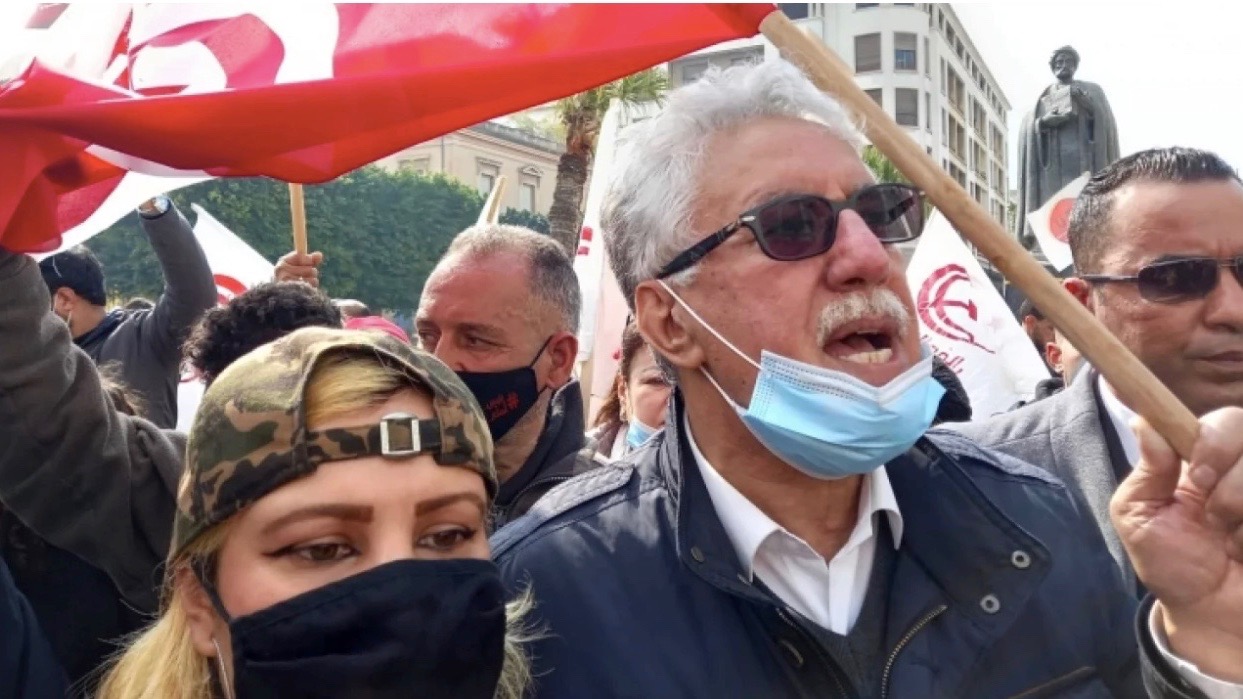Hamma al-Hammami, the general secretary of the Workers’ Party of Tunisia (WP), has asserted that his party, along with its allies, will soon launch a national campaign to overthrow President Kais Saied’s political and constitutional system. According to the WP, Saied’s so-called reforms exploit the popular anger against the established ruling class, which has failed to deliver on all the popular demands following the 2011 revolution.
Despite widespread concerns and opposition, Saied promulgated a new constitution that gives unprecedented powers to the president, including the power to appoint and dismiss government and judicial officials, raising fears of authoritarianism. Saied now wants a new electoral law that will govern the upcoming national elections in December.
Since dismissing the elected government in the country on July 25 last year, Saied has claimed that the silent majority in Tunisia supports his agenda to “purify the country” of corruption, inefficiency and nepotism. However, WP member Sana Baazaoui argues that such claims are nothing but a way to seek popular approval for his authoritarian rule. Saied’s “reactionary and tyrannical project is based on misleading the people with slogans such as resisting corruption and power to the people,” Baazaoui said to Peoples Dispatch.
Failed referendum
All major political parties, including the Islamist Ennahda Movement which holds the largest number of seats in the now-dissolved parliament, led a boycott campaign against the referendum. On July 25, only around 30% of voters turned up to vote in the referendum. However, Saied gave a spin on the results, claiming that over 94% of those who voted supported the new constitution despite “attempts to foil the referendum.”
The WP, like most other parties, called the bluff, underlining the fact that not many of those who came out to vote on July 25 knew the content of the new constitution as the draft released before the vote was partial. Thus they believe those who voted for the constitution were unable to fully understand its implications for Tunisian democracy.
Read more: Ali Jallouli: ‘The Tunisian people are against absolute autocracy’
The draft released for public consultation before the referendum, as well as the process of its formulation, were heavily criticized. Sadok Belaid, the head of the drafting committee, appointed by Saied himself, claimed that there were later changes made to the draft he had submitted which were “dangerous.”
Sensing uncertainty regarding its popular reception, Saied had declared that the results of the referendum will have no bearing on the new constitution. This further delegitimized the process.
The WP has repeatedly argued that neither Saied’s rule, nor his so-called reforms have any legitimacy. The party has asserted that Saied does not have the right to disown the constitution according to which he was elected and sworn to power.
Larger agenda to protect ruling class interests
Following the referendum, the WP remains as the sole major political group that has vowed to continue the fight against Saied’s coup with a constructive alternative.
The WP firmly believes that Saied’s coup, in a way, is an attempt to save the ruling establishment – which remained as a “dependent bourgeoisie tied to world monopoly capital” despite the revolution – from growing public anger and a repeat of 2011.
While Tunisia’s economy was in crisis before 2020, the complete collapse of the economy during the COVID-19 pandemic further incited public anger. Poverty and unemployment, two major reasons for the 2011 revolution, have increased since then, and almost half of the population now lives below the poverty line. The mismanagement of national finances has forced Tunisia to negotiate loans with the IMF and the World Bank, even for paying salaries and importing food grains.
As Baazaoui argues, Saied’s coup seems like “it is a rescue plan of the regime at a time when public anger and social movements against it began to grow.” Saied’s forced changes, as the WP accuses, are brought to re-establish former dictator Zine El Abidine Ben Ali’s system.
In this context, Baazaoui underlines, the movement of the WP should not be seen merely as a movement against Saied. The party is also trying to highlight how “the rule of the Ennahda or the rule of the pre-revolutionary forces (in particular the Free Dasturian party)” has been “reactionary and destructive” to the interests of the Tunisian people.
The complicity between Saied and the present ruling classes, their common adherence to neoliberalism, and complete disregard for millions of Tunisians is evident in the solutions proposed by Saied to solve the country’s economic problems. For example, Saied’s administration has recently announced a new system of cash transfer instead of subsidies on basic goods and commodities.
Against the broad alliance of ruling elites, WP leader Ali Jallouli told Peoples Dispatch that his party “will confront and will bear out [its] historical responsibility as a party of the working class and the toiling masses in Tunisia..in the path to complete liberation and for the actual emancipation of.. people.”





